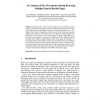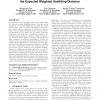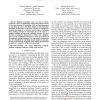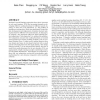2504 search results - page 30 / 501 » Methods for comparing rankings of search engine results |
HCI
2009
13 years 8 months ago
2009
In general, most search engines display a certain number of search results on a search results page at one time, separating the entire search results into multiple search results p...
WWW
2010
ACM
14 years 5 months ago
2010
ACM
We introduce a new dissimilarity function for ranked lists, the expected weighted Hoeffding distance, that has several advantages over current dissimilarity measures for ranked s...
WEBI
2010
Springer
13 years 8 months ago
2010
Springer
Ranking microblogs, such as tweets, as search results for a query is challenging, among other things because of the sheer amount of microblogs that are being generated in real time...
CIKM
2008
Springer
14 years 19 days ago
2008
Springer
Machine Learned Ranking approaches have shown successes in web search engines. With the increasing demands on developing effective ranking functions for different search domains, ...
CIKM
2009
Springer
14 years 5 months ago
2009
Springer
No search engine is perfect. A typical type of imperfection is the preference misalignment between search engines and end users, e.g., from time to time, web users skip higherrank...




